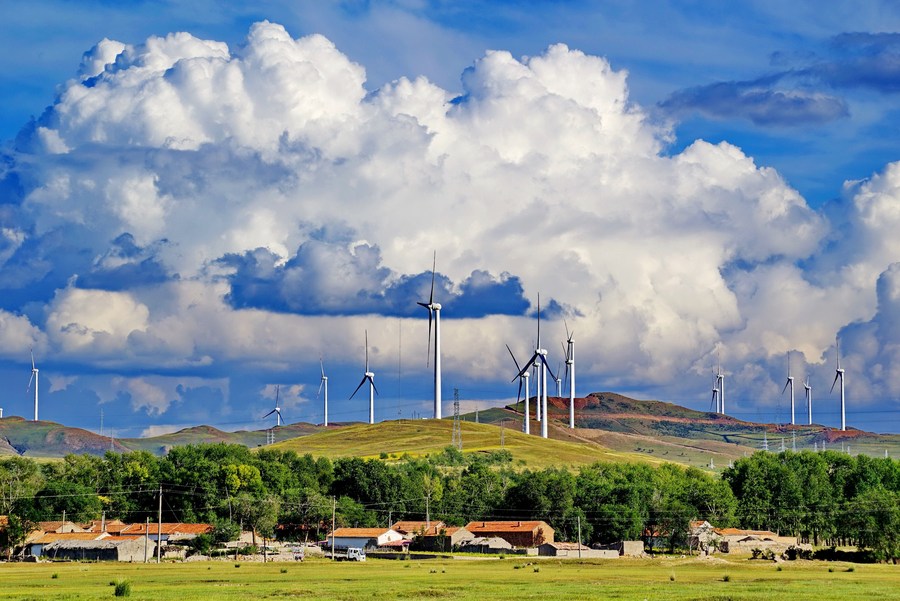Xi to attend climate summit at Biden's invitation

The file photo shows a wind power plant in Zhangjiakou, North China's Hebei province. [Photo/Xinhua]
Event expected to work as cooperation platform for nations to tackle challenges
President Xi Jinping's participation in the upcoming climate summit could make the widely watched meeting more constructive and fruitful as the world is gearing up for more ambitious climate goals.
At the invitation of United States President Joe Biden, Xi will take part in the Leaders Summit on Climate and deliver an important speech to the summit via video link from Beijing on Thursday, Foreign Ministry spokeswoman Hua Chunying announced on Wednesday.
The two-day meeting, which could see the participation of about 40 world leaders, has drawn global attention, as it's the first summit hosted by the US on climate issues since the departure from office of former US president Donald Trump, who was noted for his disregard of the global climate crisis.
It also comes as the world is in dire need of a concerted effort to implement the Paris Agreement and take the issue a step forward.
At a news briefing on Wednesday, Foreign Ministry spokesman Wang Wenbin said that China hopes that the summit can be an "exchange and cooperation platform for global cooperation to tackle climate challenges, facilitate the effective and comprehensive implementation of the Paris Agreement, and promote concerted efforts in global climate and environmental governance".
In the past week, China has engaged in a series of high-level climate talks. On Friday, the top leaders of China, France and Germany agreed during a virtual summit to jointly work toward an equitable and reasonable climate governance mechanism.
At the meeting, Xi reiterated China's commitments to peak its carbon emissions before 2030 and attain carbon neutrality before 2060. He also said China had decided to adopt the Kigali Amendment to the Montreal Protocol and is stepping up curbs on emissions of non-CO2 greenhouse gases.
China and the US issued a joint statement on Sunday on coping with climate change after Xie Zhenhua, China's special envoy for climate change affairs, and US Special Presidential Envoy for Climate John Kerry met in Shanghai.
In his written address to a forum on carbon neutrality on Tuesday in Beijing, Xie said, "The joint statement issued after the China-US climate dialogue fully demonstrates that we can work together toward a sustainable future only via pragmatic cooperation and with joint efforts to seek for answers and paths."
Sino-US cooperation vital
The joint statement said the two countries will beef up their respective climate action while joining hands in efforts to bring the goals included in the landmark Paris Agreement into reality.
The Paris Agreement, adopted in 2015, aims to keep the global temperature increase this century below 2 C from preindustrial levels and to pursue efforts to limit the temperature increase even further to 1.5 C.
Richie Merzian, a former Australian government negotiator to the United Nations Framework Convention on Climate Change, said he expected to see a positive outcome from possible talks between China and the US during the summit.
"It's only because China and the US came together in 2015 that we had a Paris Agreement," Merzian, who is also director of the Climate and Energy Program at the Australia Institute, said in an interview with Xinhua News Agency. "That is how important both those countries are to global efforts."
China and the United States have been widely praised for laying the foundations of international support for the Paris Agreement. Following Xi's visit to the US in June 2013, then US president Barack Obama visited China in November 2014.
On Nov 12, 2014, the two presidents made public the China-US Joint Announcement on Climate Change, which said they "resolved to work closely together over the next year to address major impediments to reaching a successful global climate agreement in Paris".
Merzian said it was in the interests of China and the US to address climate change, as both of them suffered consequences such as increased frequency and severity of extreme weather events.
The scholar also noted that countries could benefit from the new economy to be created in climate change mitigation efforts. "Those are the green technologies that China has been doing so well, manufacturing and shipping out to the world and also implementing domestically," he said.
"So really, everyone benefits when China and the US can work together," he said.
Lin Jiaqiao, co-founder and co-director of the Beijing-based Rock Environment and Energy Institute, said he saw electric vehicles and renewable energy as two sectors offering potential for cooperation between China and the US.
The two countries have listed these two sectors as strategies to decarbonize their economies, as well as to increase employment opportunities and stimulate economic growth. However, they still need to hammer out a substantive cooperation framework for the sectors based on the consensus outlined in their joint climate statement, Lin said.
[page]

A68, formerly known as the biggest iceberg in the world, melts as a result of climate change as it drifts toward South Georgia Island in the South Atlantic in December. The iceberg covered an area of nearly 6,000 square kilometers and weighed billions of metric tons when it broke away from Antarctica in 2017. [Photo/Agencies]
More targets envisioned
Experts have also expressed high expectations about major economies unveiling more ambitious climate targets before or at the virtual summit.
According to a statement by the US government, by the time of the summit, the US will announce an ambitious 2030 emissions target as its new Nationally Determined Contribution for post-2020 climate action under the Paris Agreement.
Quoting unnamed sources, The Associated Press said in a report on Tuesday that Biden will pledge to cut US greenhouse gas emissions by at least half by 2030, which is nearly double the nation's previous commitment.
"While China announced an updated nationally determined contribution last December, the ball is now in the US court," said Zhang Jianyu, founder and chief representative of the Environmental Defense Fund's China program.
China announced late last year that it will lower its carbon dioxide emissions per unit of GDP by over 65 percent from the 2005 level and increase the share of non-fossil fuels in primary energy consumption to around 25 percent by 2030. The country will also increase the share of non-fossil fuels in primary energy consumption to around 25 percent.
The European Union also reached a tentative climate deal on Wednesday that is intended to make the bloc climate neutral by 2050.
"Our political commitment to becoming the first climate neutral continent by 2050 is now also a legal commitment. The climate law sets the EU on a green path for a generation," European Commission President Ursula von der Leyen said early on Wednesday.
Under the provisional deal reached after officials negotiated through the night, the EU will also commit itself to an intermediate target of cutting greenhouse gas emissions by at least 55 percent by 2030 compared with 1990 levels, AP reported.
On Tuesday, the UK government pledged to cut carbon emissions by more than three-quarters of their 1990 levels by 2035 while closing a loophole that had left much of the pollution from airplanes and ships out of the tally, according to AP.
On Wednesday, Russian President Vladimir Putin said that Russia's emissions of greenhouse gases should be less than the EU's over the next 30 years, but that it would be difficult to reach that goal given Russia's size, Reuters reported.








